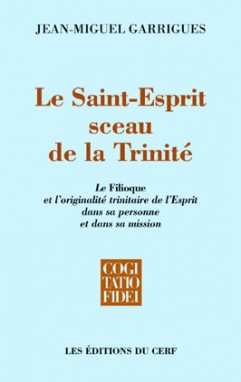Le Saint Esprit sceau de la Trinité - CF 276
de
Jean-Miguel Garrigues
Collection Cogitatio Fidei - N° 276
256 pages - mars 2011
25,00€
De la manière dont on comprend que l'Esprit procède éternellement aussi du Fils (« Filioque ») dans la Trinité dépend l'équilibre entre sa mission et celle du Christ dans la vie du croyant et de l'Église. Ce livre porte d'abord sur l'origine éternelle du Saint-Esprit dans la Trinité. La doctrine de la procession de l'Esprit « ex Patre Filioque » ne fait-elle pas de lui une personne subordonnée et sans réciprocité vis-à-vis du Père et du Fils, comme les théologiens orthodoxes le reprochent aux catholiques ? Depuis le début des années 1970, où ont débattu de cette grande question avec Olivier Clément, le père Bobrinskoy et d'autres théologiens orthodoxes de l'Institut Saint-Serge, l'auteur n'a cessé de reprendre et d'approfondir cette question, aussi bien par rapport aux sources patristiques que par rapport à la théologie de saint Thomas d'Aquin. En 1981, il a publié un premier état de ses travaux dans un volume intitulé « L'Esprit qui dit : Père ! ». Par la suite, il est intervenu comme expert dans l'élaboration du document romain de clarification, « Les traditions grecque et latine concernant la procession de l'Esprit-Saint » (Conseil pour l'unité des chrétiens, septembre 1995). Dans le présent ouvrage, il rassemble toutes ses recherches depuis la clarification romaine du « Filioque » et en développe les conséquences pour la théologie trinitaire du Saint-Esprit. Comme le père Congar l'avait vu, de la manière équilibrée ou exorbitée (« christomonisme ») dont est compris le « Filioque » dépend tout l'équilibre de la mission de l'Esprit par rapport à celle du Christ dans la vie de la grâce, dans la vie sacramentaire et liturgique et enfin dans la communion ecclésiale selon ses différentes articulations : homme — femme, juif — gentil, prêtre — laïc, Église universelle — Églises particulières.
--
The equilibrium between the mission of the Spirit and that of Christ, in the believer’s life and the Church, depends on how we understand that the Spirit proceeds eternally from the Son (‘Filioque’) in the Trinity of the Church. This book treats first of all the eternal origin of the Holy Spirit in the Trinity. Doesn’t the doctrine of the procession of the Spirit (‘ex Patre Filioque’) make the Spirit a subordinate, without reciprocity in relation to the Father and the Son (as Orthodox theologians say in criticism of Catholics)? Since the beginning of the 1970s, when this great question was debated by Olivier Clément, Father Bobrinskoy and other Orthodox theologians of the Institut Saint-Serge, the author has been tirelessly rethinking and scrutinizing this question in relation to patristic sources and to the theology of Saint Thomas Aquinas. In 1981, he published a first account of his research in a volume entitled L'Esprit qui dit: Père! Then he contributed in his role of consultant expert in the elaboration of a Roman text of clarification, ‘The Greek and Latin Traditions Regarding the Procession of the Holy Spirit’ (Pontifical Council for Promoting Christian Unity, September, 1995). In this book, the author assembles all his research since the Roman clarification of ‘Filioque’ and develops the consequences for the Trinitarian theology of the Holy Spirit. As Father Congar had realised, all the balance of the Holy Spirit’s mission in relation to that of Christ in a life of grace; in sacramental and liturgical life; and finally in ecclesial communion in its different elements: man-woman, Jew-Gentile, priest-layman, Universal Church-specific Church… depends on the balanced or eccentric manner (‘Christomonism’) in which the ‘Filioque’ is understood.
- Dimensions : 135x215x13
- ISBN : 9782204093842
- Poids : 330 grammes
